Amidst unimaginable loss, over 85 new families have joined the Parents Circle since October 7, 2023.
Their membership helps to transform their grief into a powerful call for peace.
Your support will help bereaved Israelis and Palestinians to strengthen the humanity in one another and become the courageous reconciliation leaders both sides so desperately need.
If they, who have paid the highest price can choose peace, surely so can we.
Donate now to inspire hope.
Share to
social media
Share to
social media

“The pain deepened since October 7th when I lost more than 25 family members in Gaza. For us Palestinians, loss is not limited to the death of loved ones; it encompasses the loss of childhood, livelihood, education, health, love, and dignity…”
“I am a mother of four living in Tzur Hadassah. My son, Lieutenant Yanai Kaminka, was killed on October 7th in a fierce and bloody battle at the Zikim training base while fighting to protect his soldiers and many civilians who were taking shelter at the base from the Hamas attack…”
“My family is originally from Haifa, but they were forcibly displaced to Jenin. I married and had my first son, named Mohammed. He was both my son and my friend. On January 2, 2024, Mohammed took a picture of the Israeli army tearing down our neighbor’s house. The army thought otherwise…”
“Ido and I were married in March 2023. He was a military man, but that career did not align with how I view the world. Ido was a values-driven educator, who brought those values into his role. On October 7, 2023, he was commanding the Kerem Shalom area…”
“I am Hala Al-Bukhari, living in Jerusalem. My daughter, my sister, and her large family live in Gaza. On the morning of October 18th, 2023 came harsh news: my sister’s house was bombed… ”
“I am Liat Atzili. My partner Aviv and I built a life and a family on Kibbutz Nir Oz. On October 7th, 2023 a quarter of our kibbutz was either killed or taken hostage… including me and my husband.”
“I am Mazen from Bethlehem. My family lives in Beit Lahiya, Gaza. They lived in a beautiful house and went on about their lives. It all stopped on October 10, 2024…”
“My name is Liora Ailon, and I am from Kibbutz Kfar Aza. On October 7, 2023, Hamas militants entered the kibbutz. My eldest daughter, my youngest son, and two granddaughters were with me…”
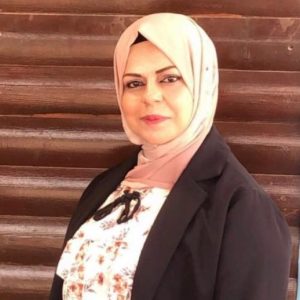
“These families stand united in rejecting violence, occupation, and the policies that fuel it. Their courage in sharing their pain and their commitment to peace are a source of great inspiration for me.”
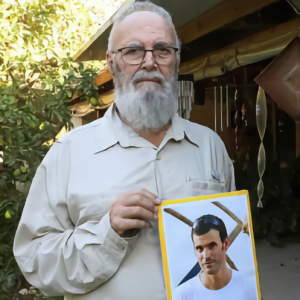
“Hamas did the worst of all possible things to me, and I still think, even more strongly, that the only way – which nobody talks about and which we keep moving further from – is to sit down and talk, to find a way to make peace.”
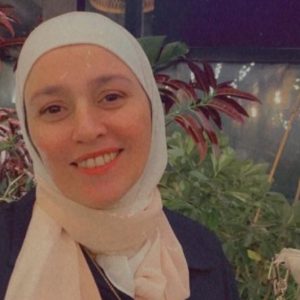
“I am a mother of five from Nablus. In 2014, I lost my husband, leaving me to raise our children amidst the instability of occupation. It has been a journey filled with fear, uncertainty, and unimaginable pain. I have lost many loved ones to this conflict…”
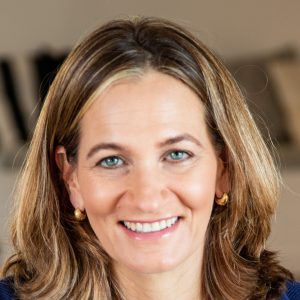
“I share my life with my husband, Danny, and our three children, in Tel Aviv. On October 7, 2023, my parents, Belha and Yaakov, were killed in their home in Moshav Netiv Ha’Asara. The pain of losing them has been indescribable. It was a wake-up call for me — a reminder that we must pursue peace…”
The Parents Circle often says it does not want any new members. But amid the unprecedented scale of disaster, loss, and destruction in Palestine and Israel since October 7, 2023, over 85 new families have joined.
They are united in their grief, and in their commitment that this must be the last war, that there be no more needless deaths. As those who have suffered the worst, they feel compelled to advocate for peace and reconciliation. Joining the PCFF at this critical juncture demands courage, an unwavering belief in peace, and exceptional determination.
After nearly 30 years, the Parents Circle – Families Forum is at a turning point. These members, profoundly impacted by trauma, will emerge as some of the most compelling voices for both Israelis and Palestinians. They will shape the future of the organization as facilitators, public speakers, media spokespeople, presenters, staff leaders, and board members, guiding it with resilience and hope through a period marked by profound grief and uncertainty.
Join us in supporting our newly bereaved members and amplifying their courageous voices.
Your generous support today will help with:
Building Community and Trust
Newly bereaved members often meet ‘the other side’ for the first time through our organization. Through both uni-national and bi-national in-person meetings, we create opportunities for newly bereaved Israelis to meet Palestinians and vice versa. Getting to know the other side is critical in cultivating reconciliation.
Personal Learning and Growth
Nonviolent activism brings a renewed sense of purpose as they transform their grief into action towards peacebuilding. For example, in October, bereaved Israeli members helped pick olives in Palestinian members’ groves. This activism is a sign of solidarity and a strong statement to the other side.
Peacebuilding Leadership Development
Conflict resolution workshops will help develop the skills and confidence needed to become effective advocates, facilitators, and community leaders.
Your support will help bereaved Israelis and Palestinians to strengthen the humanity in one another and become the courageous reconciliation leaders both sides so desperately need.
Share to
social media
Share to
social media
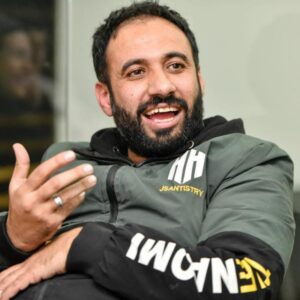
I want to take a moment to share my story—one marked by profound sorrow and loss. My name is Musa Jumaa, and I am 38 years old. Though I was born in a city known for peace and faith, I have only spent three days there in my lifetime. Today, I am both a doctor and a writer, but my heart is heavy with the pain of losing loved ones.
Like so many Palestinian families, mine is scattered—some in the West Bank, others in Gaza, Jerusalem, and even abroad. I joined the Parents Circle – Families Forum (PCFF) almost two years ago, following the tragic loss of my cousin, Yusuf Jumaa. He was shot by an Israeli soldier in Al-Ram at the beginning of 2023. That day, as we stood in front of our modest shop, the soldier chose Yusuf—not me or his brother.
After Yusuf’s burial, my seven-and-a-half-year-old daughter asked me, “Why do you put flowers on his grave? Why not give them to my friend, Fatima?” Her innocent question pierced my heart and flooded my mind with more questions. Why do we keep placing flowers on graves when we could give them to the living, to show our desire for life—life with dignity, freedom, and rights in our homeland? It was then I realized that I had changed, and if I could change, perhaps I could inspire others to change too.
A friend invited me to join the PCFF, a community devoted to sharing personal narratives and choosing peace alongside Israelis which has always been important. When I shared my personal story, I knew I had found my place. Now, I am a member of the PCFF, the only organization in the world I wish never had to welcome new members. The Parents Circle holds space for our Israeli partners and their stories of loss are just as powerful as our own stories. Humanity is something you feel, not just something you read about. It is something to experience.
The pain deepened since October 7th when I lost more than 25 family members in Gaza. In this war, Gazans endure not only bombs and tanks but also hunger and the constant presence of fear. For us Palestinians, loss is not limited to the death of loved ones; it encompasses the loss of childhood, livelihood, education, health, love, and dignity.
I carry the stories of my family with me, and if this war persists, there will be more stories to tell. One that haunts me is the story of my uncle Hani, a doctor at the European Hospital in Gaza. When he learned that his home had been bombed, he rushed back, only to discover that while his wife and son had been rescued by neighbors, his daughter, Mira, remained trapped under the rubble. In his desperation, he returned to help, but the house was bombed again, killing him and several neighbors. Mira has remained under the rubble since December 2023.
These stories weigh heavily on me, but I share them to honor the memories of my loved ones and to illuminate the ongoing suffering. As a Palestinian, my message is simple yet urgent: true peace cannot be forged through international negotiations alone. It must be born from the hearts and minds of people, through mutual understanding of what peace means to each of us.
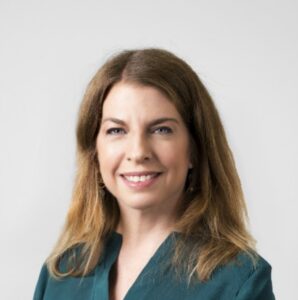
I am a mother of four living in Tzur Hadassah. My son, Lieutenant Yanai Kaminka, was killed on October 7th in a fierce and bloody battle at the Zikim training base while fighting to protect his soldiers and many civilians who were taking shelter at the base from the Hamas attack. I am a humanist who believes in creating mutually respectful relations and reconciliation processes between Israeli and Palestinians.
Before October 7, I Was active in collaborative initiatives in her area, volunteering with the organization “Humans Without Borders”, which transports Palestinian children to hospitals in Israel, and with “Tag Meir”, which supports victims of hate crimes.
During the Shiva for Yannai, I wrote a letter to my Palestinian neighbors in Wadi Fukin, Hussan, and Battir: “Dear neighbors, it hurts me, it hurts so much, but I wanted to tell you that out of this pain my heart is open to you. I do not blame you for the actions of Hamas, and I hope that this damned situation will somehow bring our peoples to finally learn to live together, with mutual respect, so that there will be no more parents, Israelis or Palestinians, who will mourn their sons. There is no other way.”
I am Kholoud Houshiya and I live in the village of Al Yamun near Jenin. Originally my family is from Haifa. I wasn’t able to experience childhood due to the occupation, which forcibly displaced my family to Jenin under oppression and humiliation.
Later, I married and I gave birth to my first child, whom I named Mohammed. I raised him with all my love and effort.
Mohammed was a young man who loved life dearly, and he loved me even more. He was both my son and my friend, thanks to our close bond.
Mohamad was 23 years old. He worked in Israel and helped his father.
On January 2, 2024 Mohamed took a picture of the Israeli army tearing down my neighbor’s house. The army thought otherwise and they shot him. Just because he was Palestinian.
I always dreamed of seeing my son as a groom, just like any mother. But now, I am left with him buried in my garden. I had hoped to see him, his wife, and his children in my house, but now, every day, I look at his grave from the window in my room.
My message to the world is this: Enough. Enough killing, enough injustice, enough destruction, enough oppression. Enough violence on both sides.
It is not easy for a mother to recount the story of her son’s death—the pain is indescribable. I cannot bear the loss of another child. This is why we must raise the voice of the mothers for a better future for all children and young generations – Palestinians and Israelis.
I am Hala Al-Bukhari, living in Jerusalem.
My daughter, my sister and her large family, children and grandchildren live in Gaza. Despite the distance, before the war, I used to communicate with them daily, checking on their health via video call.
On the morning of October 7th, my son told me to watch TV to see what was happening in southern Israel. From that day, fear has overwhelmed my heart.
Then came the morning of October 18th, bringing the harsh news: My sister’s house was bombed, and she, her husband, her children, and grandchildren were in the house—33 innocent lives lost in this horrific massacre. Since then, my fear for my daughter has grown. I have pleaded with human rights organizations, seeking any means to get her out of the hell of war and the horror of the massacres. Eventually we succeeded to get my daughter out of Gaza.
With every word I write, I struggle to express the extent of my pain. Our hearts bleed with grief for those we have lost and continue to lose. Our sorrow is profound, and our souls yearn for the peace we all dream of.
Let us all live in peace and build a better future for our children. War brings only destruction and ruin to everyone involved, whether Palestinian or Israeli. It is always the innocent people who suffer the most.
I am Liat Atzili from Kibbutz Nir Oz.
My partner, Aviv and I built a life and a family in Nir Oz. We were an inseparable part of this little community, which fulfilled our aspirations and needs. Mine as an educator, and Aviv’s as a farmer and an artist.
On October 7th, our kibbutz was attacked, conquered, and destroyed by Hamas. A quarter of the residents were either killed or kidnapped, including me. The time I spent as a hostage in Gaza was of complete despair, unending fear for my friends and family, and long days. I was nervous that I wouldn’t survive.
After 54 days in captivity, I was returned home. The following day, my family and I were told that Aviv was killed on October 7th. Aviv had hundreds of friends, he traveled and created, and made the most of every opportunity; he truly loved life.In his final year, Aviv fulfilled many dreams, the greatest being to share his art publicly. While managing the kibbutz’s agricultural garage, he painted on tractor parts and scrap metal, blending his love for metals and the Negev fields into his creations. Our children looked up to him and I feel like I had the greatest privilege to share my life with him.
I always believed that war is not our destiny, and that any conflict, including ours, can be solved. This war has proven to me beyond a doubt that we cannot continue fighting, that we have no right to impose the continued suffering of war on future generations on either side. I am ready today, more than ever, to do everything in my power so that our children can live here in peace and security.
I am Mazen from Bethlehem. Many of my family members live in Beit Lahiya, Gaza. They lived in a beautiful house and went on about their lives, despite the siege.
It all stopped on October 10, 2024, when, my uncle, his three sons, and his son-in-law were outside near the house. Israeli aircraft targeted them with bombardment and gunfire. My aunt managed to bring their bodies into the house. With trembling hands, she was forced to gather what remained of them, unable for over a week to lay her husband and three sons to rest.
I cannot believe that so many of my family are dead, and that I cannot go there to help them and cry with them.
The depth of pain in Gaza is beyond description and cannot be fathomed by the human mind. How much longer will this hatred on both sides continue? How much longer will we endure this nightmare? All the Palestinian people desire is a dignified life free from occupation—a fundamental right, just like that of any other people in the world.
The suffering will not cease until we collectively seek pathways to peace and understanding. Revenge will not forge a shared future; we must strive to find common ground and solidarity. Let us unite for a brighter future for the generations to come, and let us raise our voices for peace, so that together we may end this cycle of violence and finally live in safety and harmony.
My name is Liora Ailon, and I am from Kibbutz Kfar Aza. On Saturday, October 7th 2023 Hamas militants entered the kibbutz. My eldest daughter, my youngest son, and my two granddaughters were with me in the shelter. We were at the beginning of a day that would stretch over 35 hours.
It was 6:30 in the morning. Tal, my beloved son, a man of action, a man of purpose, a sensitive, devoted, and loving father, the commander of the standby squad of Kibbutz Kfar Aza, called up the members of his team. He left the house to open the armory, took a weapon, and ran to fight.
During the battle, he was injured but continued to lead his squad members until his last breath. In his death, Tal saved the lives of all the residents of Kibbutz Sa’ad, who remained unharmed.
Tal was a hardworking man; he loved the sea and sailing, loved people, and people trusted him. Tal’s children always knew they could rely on him, that his word was solid, that he would always be there to solve any problem and would never give up on anyone.
Tal used to say, “Never regret something that made you smile,” and since his death, we try to keep smiling despite the pain.
Before October 7th, I believed in the goodness of all people, and I refuse to stop believing in peace and reconciliation, even after the worst has happened to me and my family.
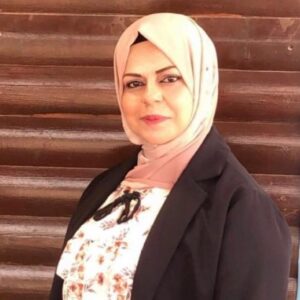
My name is Najla Al-Sharif, and I live in the Al-Arroub refugee camp in the West Bank. Originally from Gaza, I grew up there and completed my studies before marrying in 2000 and moving to the West Bank. For nearly 17 years, I endured the pain of being cut off from my family, unable to visit them because of restrictions imposed by the occupation. I missed countless moments—weddings, celebrations, and times of loss.
This past year has been marked by immense grief; I have lost dozens of family members—children, women, and the elderly. I came across the Parents Circle and decided to join, driven by a need to share our reality and reach the wider world. The support and encouragement of the PCFF’s leadership and members has given me the strength to tell my story.
But where do I start? With my cousin Ryan, who lost her husband, eldest son, and father-in-law to a drone strike as they returned from prayer? Or with my cousin Naima, whose entire family perished when a missile obliterated their home? Then there is my aunt, who lost three children, two daughters, five grandchildren, and their spouses in one merciless bombardment. Her grandson, five-year-old Muhammad, was missing for three days after the attack. The young men of the neighborhood searched tirelessly until they found him, lifeless and lying in his own blood.
My heart shattered further with the loss of my younger brother, Abdul Rahman. He had fled with my elderly parents—my father confined to a wheelchair—along with his young wife and their twin toddlers. They set up a makeshift tent in what was supposed to be a safe area. But while he was out gathering food and supplies for his children, he was killed, a victim of the relentless violence. He never returned.
These stories are only a glimpse of our suffering. Every individual carries a story, a collection of dreams and aspirations cut short. How long will we continue to recount tales of death and loss? How long will our narrative be defined by grief that tears at the heart?
The Parents Circle serves as a key pillar in building bridges of dialogue between our two peoples. What attracted me to become an active member was the involvement of our dear partners, the Israeli bereaved families who have lost their loved ones in the cycle of conflict. These families stand united in rejecting violence, occupation, and the policies that fuel it. Their courage in sharing their pain and their commitment to peace are a source of great inspiration for me.
I lift my voice and my prayers to the heavens, to God, the Lord of mercy and peace. I call upon the world to listen to our cries: let the hands of war, killing, and occupation be stayed. We yearn for an end to violence and a life of peace and security, not just for ourselves, but for our children, our families, and all of Palestine.
I share this story with sincerity and honesty, knowing it reflects only a fraction of my reality. My heart carries sorrow intertwined with hope. I envision a world filled with humanity, love, and sacrifice, and I pray for collective action to stop the ongoing violence in Gaza, throughout Palestine, and in Lebanon. Together, let us strive to end the occupation and build a life of dignity and safety for all.
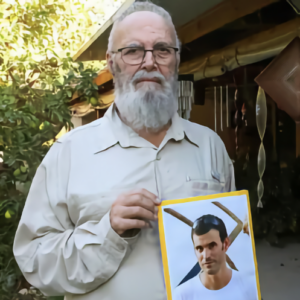
Yuval’s son, Dror, and his daughter-in-law, Yonat, were killed in Kibbutz Beeri on Oct 7th. His three grandchildren were kidnapped and returned in the November 2023 hostage deal. His son’s body is still held hostage in Gaza. Today, Yuval and his wife are the primary caretakers of their grandchildren.
“Hamas did the worst of all possible things to me, and I still think, even more strongly, that the only way – which nobody talks about and which we keep moving further from – is to sit down and talk, to find a way to make peace. Peace is a practical, existential move, not a romantic move. My son and daughter-in-law were murdered in Beeri. And three of my grandchildren were kidnapped and returned with the deal. Bruised and two of them orphans from two parents. I, whose life has been almost completely destroyed, continue to wish for peace more and more strongly because it is the only way to survive here.”
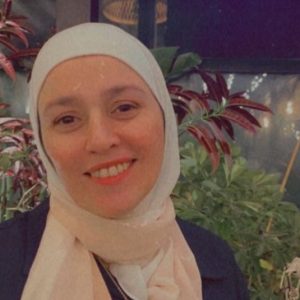
I am a mother of five from Nablus. In 2014, I lost my husband, leaving me to raise our children amidst the instability of occupation. It has been a journey filled with fear, uncertainty, and unimaginable pain. I have lost many loved ones to this conflict, including my mother-in-law and her son, killed in the bombing of Jabalia in 2008—a tragedy that deeply affected my husband and eventually led to his death.
Eight years ago, I joined the Parents Circle, seeing it as a chance to voice our suffering and share our stories with others. But grief returned in 2024, taking my beloved aunt, who was like a mother to me. She had returned to Gaza full of hope after years of displacement, only to lose her life in this devastating conflict. My sister in Gaza lives with constant terror, having been displaced seven times since October 9, 2023. It feels unbearable, yet I cling to hope — hope for reconciliation, peace, and a better life for our children.
My commitment to peace has led me to serve as a new board member of the Parents Circle this year. I believe women are essential in peacebuilding, and I am determined to empower their voices in this ongoing struggle.

I share my life with my husband, Danny, and our three children, in Tel Aviv. On October 7, 2023, my parents, Belha and Yaakov, were killed in their home in Moshav Netiv Ha’Asara. The pain of losing them has been indescribable. It was a wake-up call for me—a reminder that we must pursue peace with unwavering determination and a commitment to equality, justice, and security for everyone.
For 25 years, I’ve worked in global high-tech, developing strategies and performance measures. As the new board president, I aim to contribute these skills to the Parents Circle. I believe we have the power to change lives through understanding, respect, and cooperation, even in the face of deep despair.
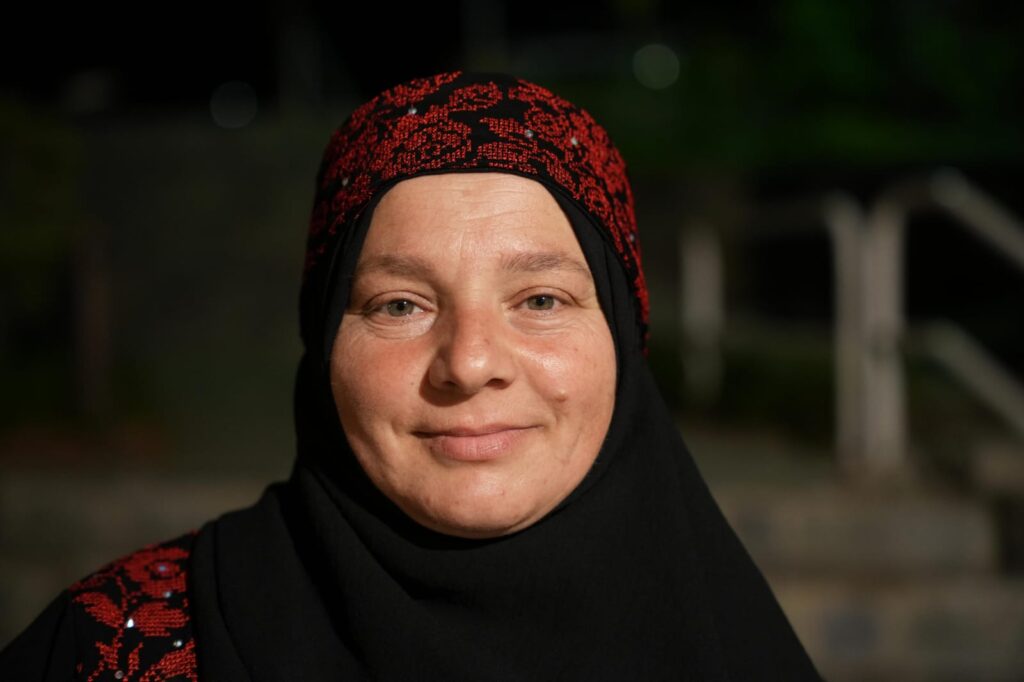
My name is Zeinat Awad, from Beit Ummar in the West Bank.
My children were born into a reality burdened by occupation, growing up witnessing daily scenes of oppression—killings, arrests, land confiscation, and the relentless expansion of settlements. My eldest son, Jaafar, was an ambitious young man, who believed that the future of his homeland could be built through education and went to law school so he could work for justice for his people. He also had a black belt in karate, and dreamed of representing Palestine in international tournaments.
One day on his way to university, he passed through a checkpoint—as usual—and his life changed forever. An Israeli soldier stopped his car, slapped him, and humiliated him in front of others. In that moment, Jaafar felt how easily a person’s dignity could be crushed, and that justice—the very thing he was studying—was absent under the occupation.
In deep frustration, a thought took shape in his mind—as he later admitted—to “teach the occupation a harsh lesson.” It was only a thought, nothing more. But before he acted upon it, the Israeli military arrested him and charged him not for an act, but for the thought itself.
Inside prison, Jaafar suffered from multiple illnesses and in early 2015, Jaafar was released in a frail and weak condition. We took him to a doctor who told me “Your son will not live for more than three months”.
We took Jaafar on an exhausting journey through hospitals for treatments—Al Ahli, Al Makassed, Al Mutlaa, and Al Mezan hospitals —where he finally passed away on April 10, 2015.
Today I am a member of the Parents Circle, and firmly believe that pain can be transformed into a force for justice and peace. My suffering continues, as my two younger sons are currently in administrative detention, with no reason given, and the youngest is only 16 years old.
Despite my loss and pain, I believe in life and in my son’s dream of education and justice. I now carry two voices within me: one of a mother who has lost her son, and one of a woman who believes that another future is possible.
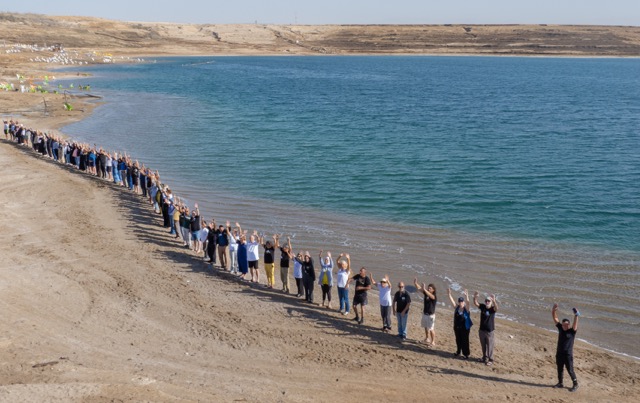
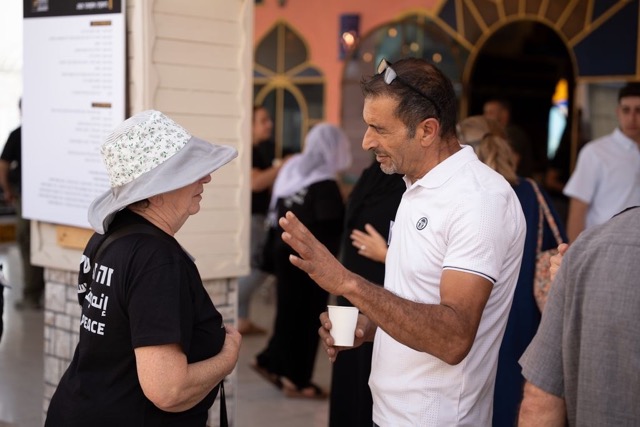
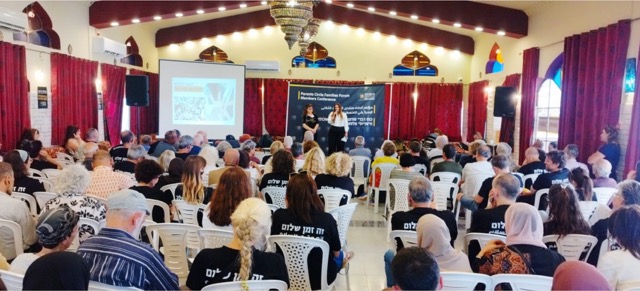
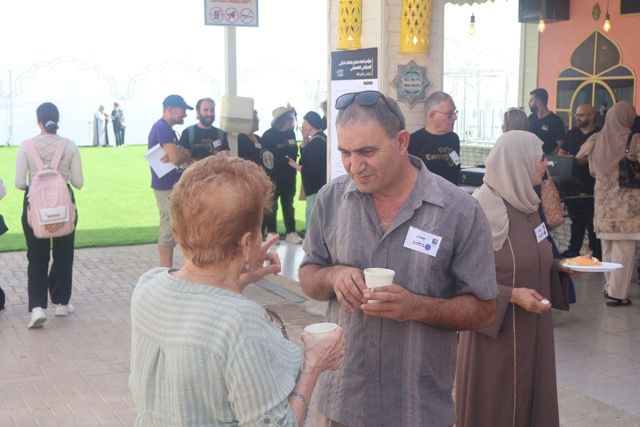
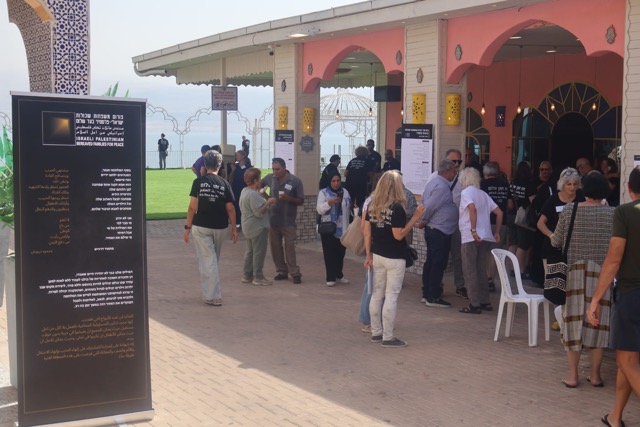
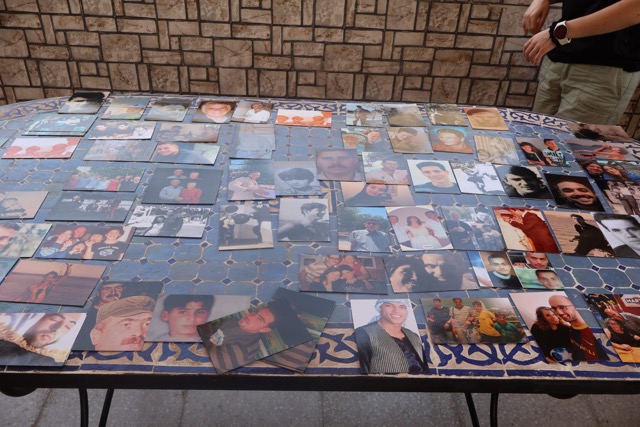
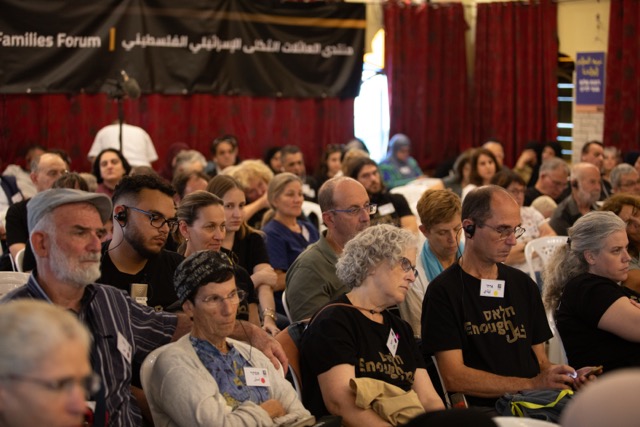
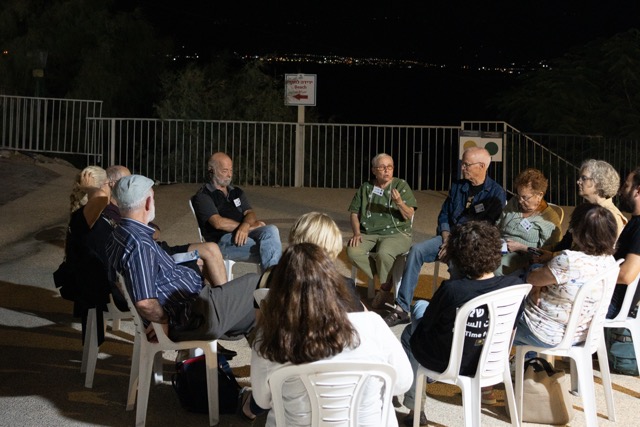
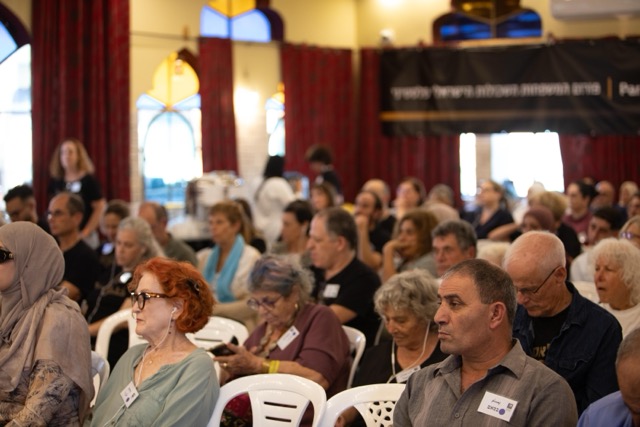
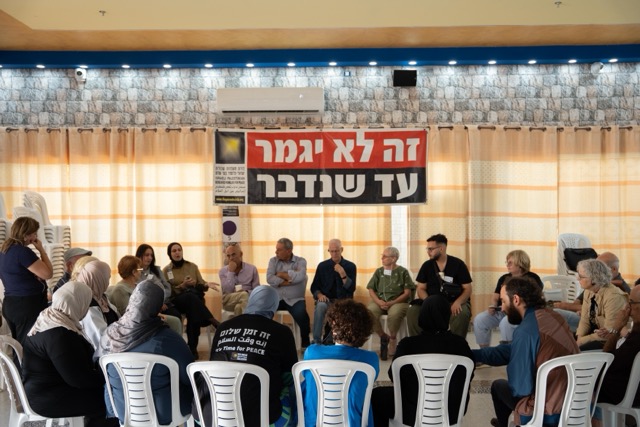
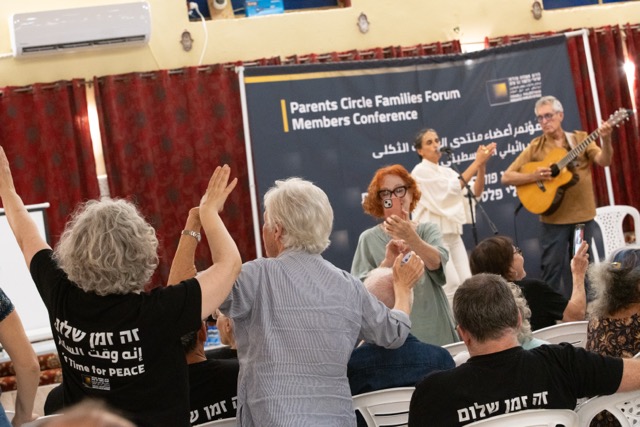
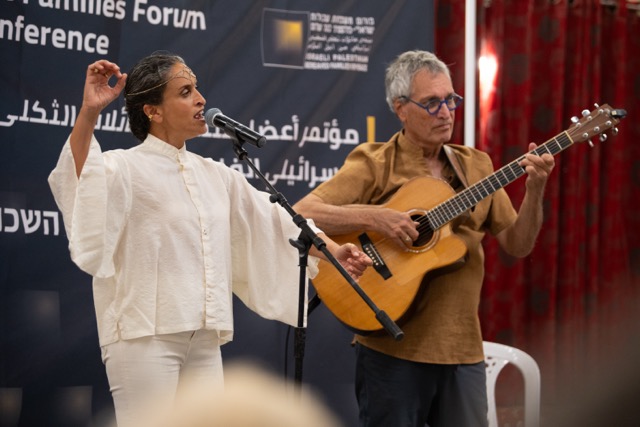
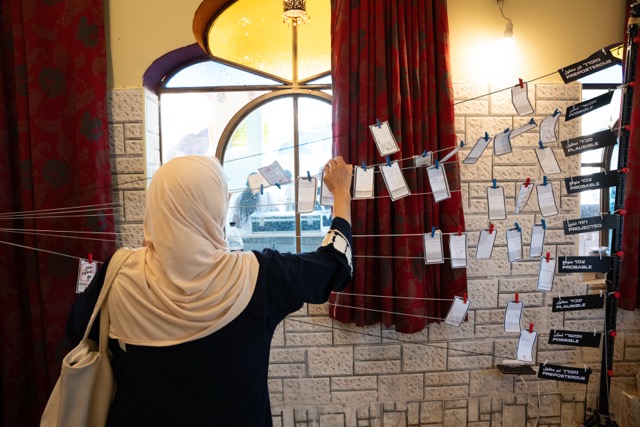
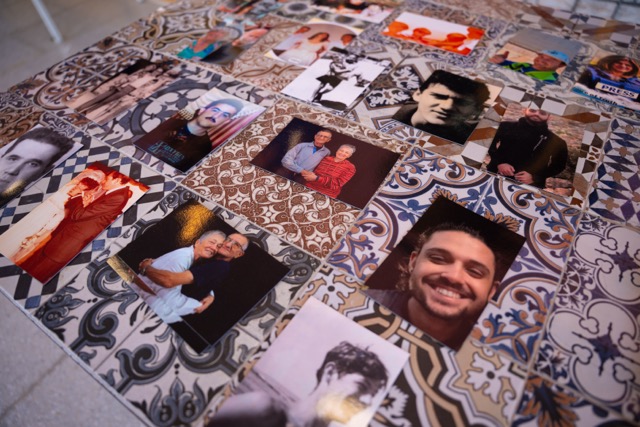
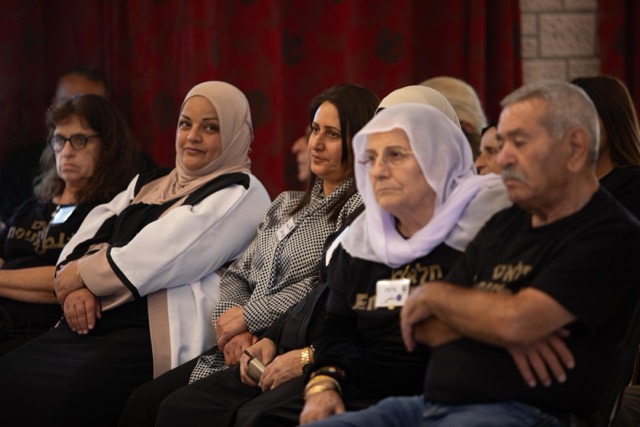
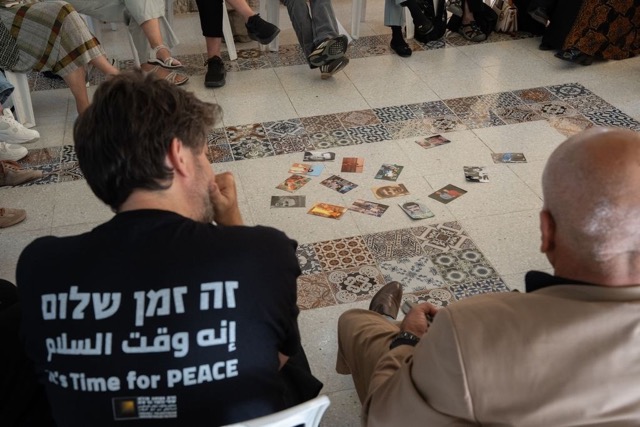
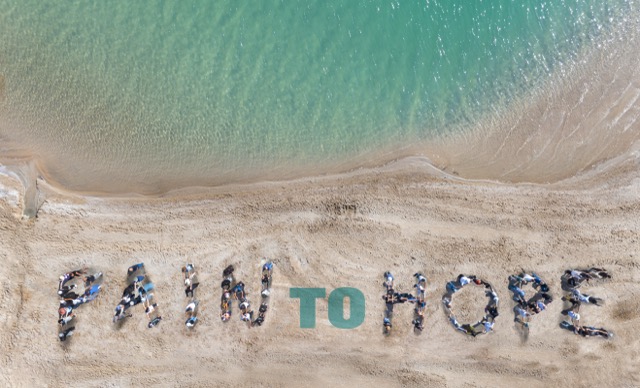
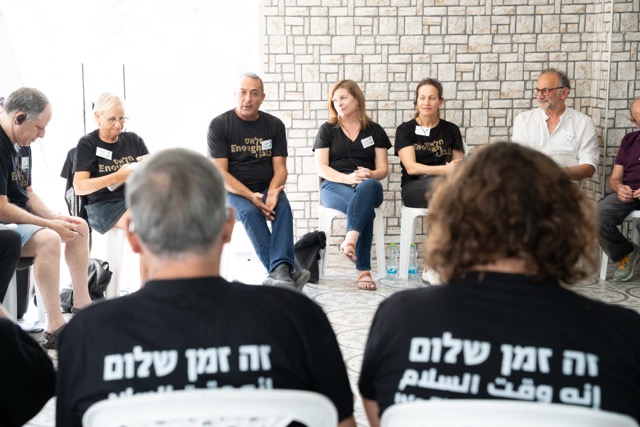
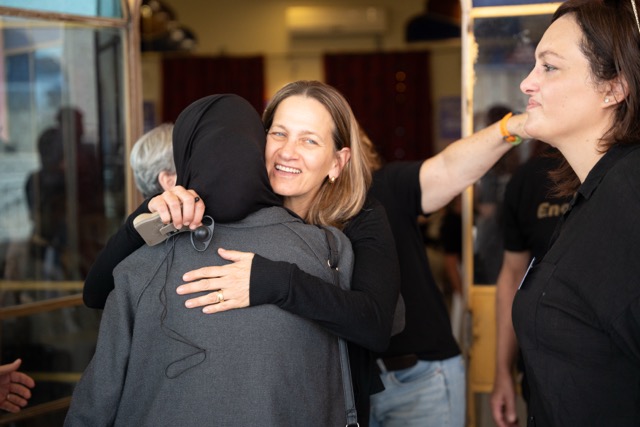
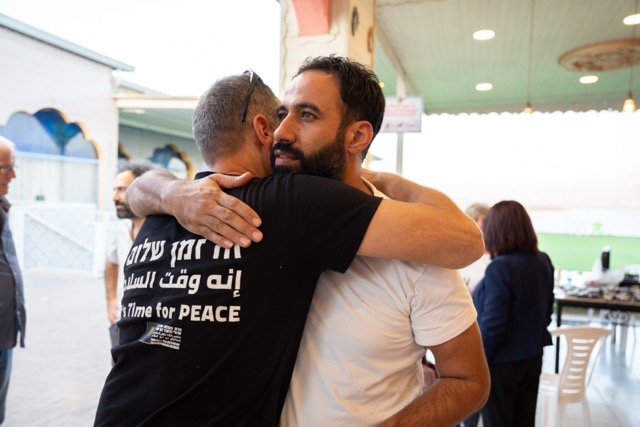
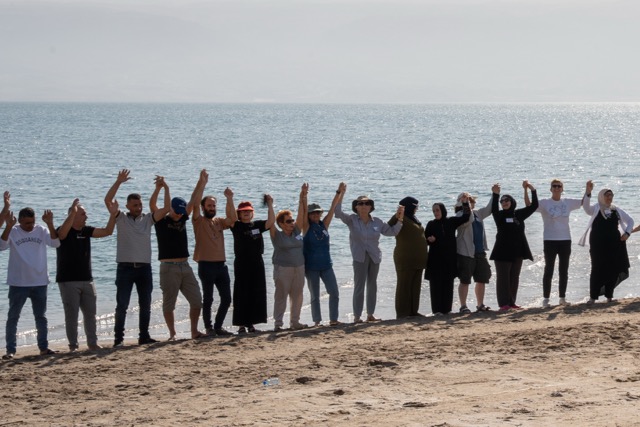
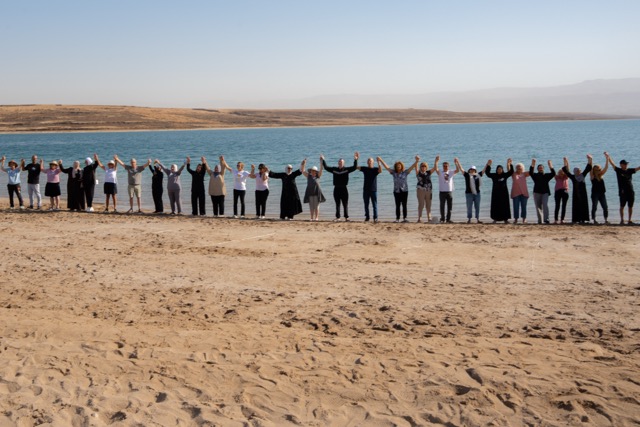
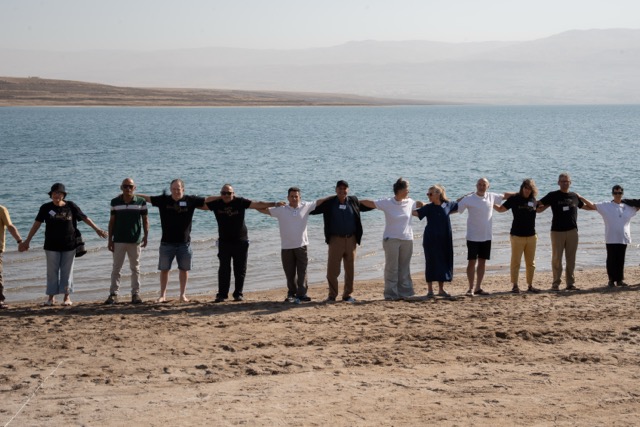
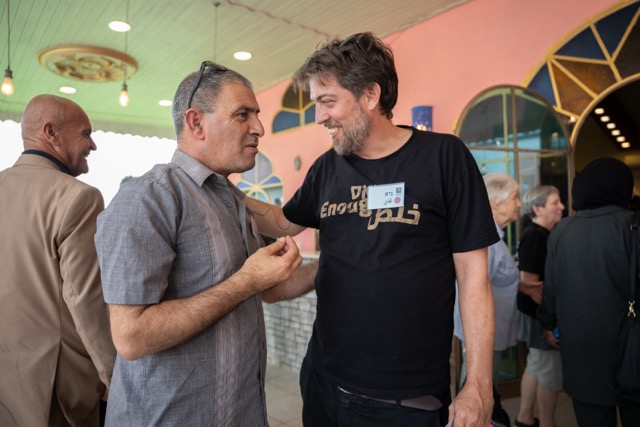
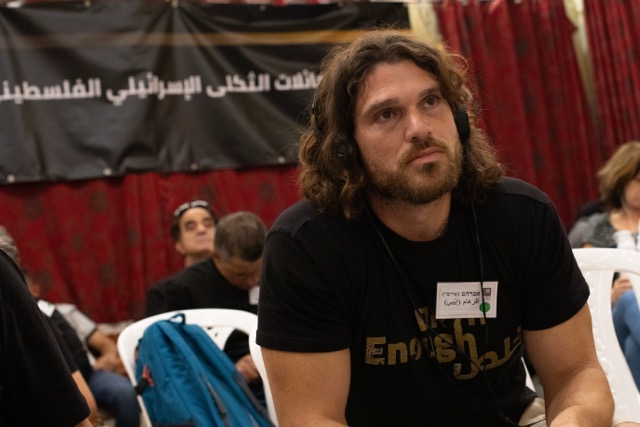
On October 30-31, over 150 bereaved Palestinians and Israelis gathered by the Dead Sea for the Parents Circle Conference. After three years of small in-person gatherings and many zoom meetings—from Covid, wartime, and military restrictions—this large gathering of hope and action is nothing short of a miracle.
The gathering consisted of dialogue meetings, political imagination workshops, and community-building activities. For many new members, it was their first time to spend time with the “other side”.
Among the stories we heard were those of new PCFF members Liora, who shared how her son was killed on October 7, 2023 while she was trapped in the safe room of her home, and Hala, who told the story of her family — she lost 57 relatives in Gaza, including her sister and her sister’s children.
The two women stood side by side, united in pain and in their shared determination to build a future based on justice, security, equality, and an end to the occupation.
“I take from this conference the belief that there is a future. We live in a world that says peace is unrealistic, that mutual destruction is the only possible future. They tell me I’m naïve, disconnected from reality, but I believe we must stand firm and continue to make a difference.”
Israeli participant
“I always say: from meeting comes understanding, from understanding comes action, and from action comes shared action. Together, we will walk toward a future ruled by peace. Working with the Parents Circle makes me feel that such a future is possible.”
Palestinian participant
Meeting together, Israelis and Palestinians build trust and solidarity across borders, and a nurturing community that helps catalyze the grief into action. These members won’t give up on peace in the face of injustice; we hope you will join them.
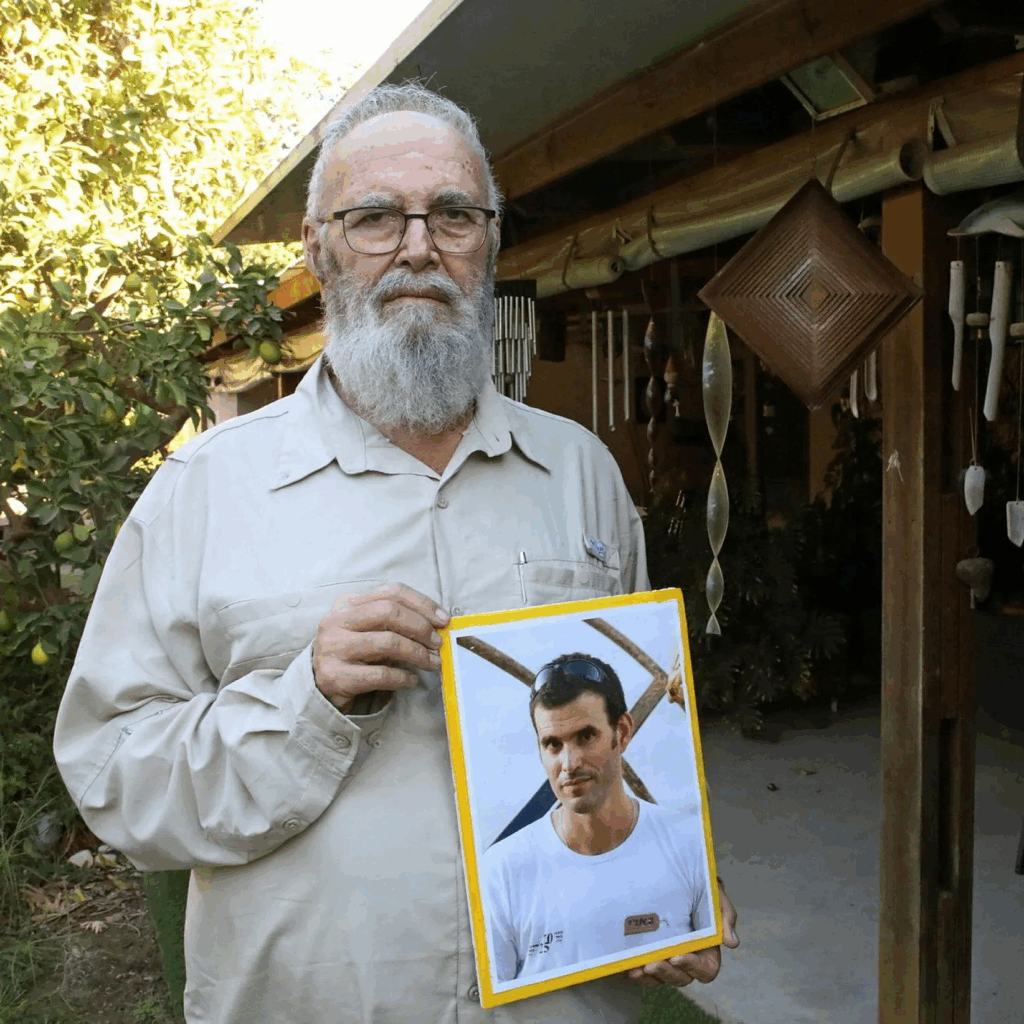
My name is Yuval Or, from Kibbutz Re’im.
On October 7, 2023, my son Dror and his wife Yonat were killed in their home, and three of my grandchildren were taken hostage to Gaza, along with Dror’s body. Our lives were destroyed.
After 50 days, my grandchildren returned home thanks to a hostage exchange deal. I don’t know what I would have done without them. I have been their primary caretaker since then, because they are orphaned.
Dror’s body is still held in Gaza. When we buried his wife we left an empty plot next to her, and we hope he will be returned so they can rest together.
After everything I’ve been through, I still believe in peace. War is not a solution. The peace I’m suggesting is not a romantic notion, it’s practical. To compromise, to manage to live together, to make agreements.
I don’t see how Palestinians will forgive Israel for what we did in Gaza, and I don’t see how Israel will forgive Hamas for what they did on October 7th. I wish something would spring up here, that something new would begin, and that slowly, peace would come from within, but we have so much hatred and pain and bereavement on both sides.
But, I believe that a Palestinian in Khan Younis wants the same thing as me: to raise our kids and to live a quiet life. And we must reconcile this horrible chapter in our history so that future generations – my grandchildren – don’t have to experience this again.
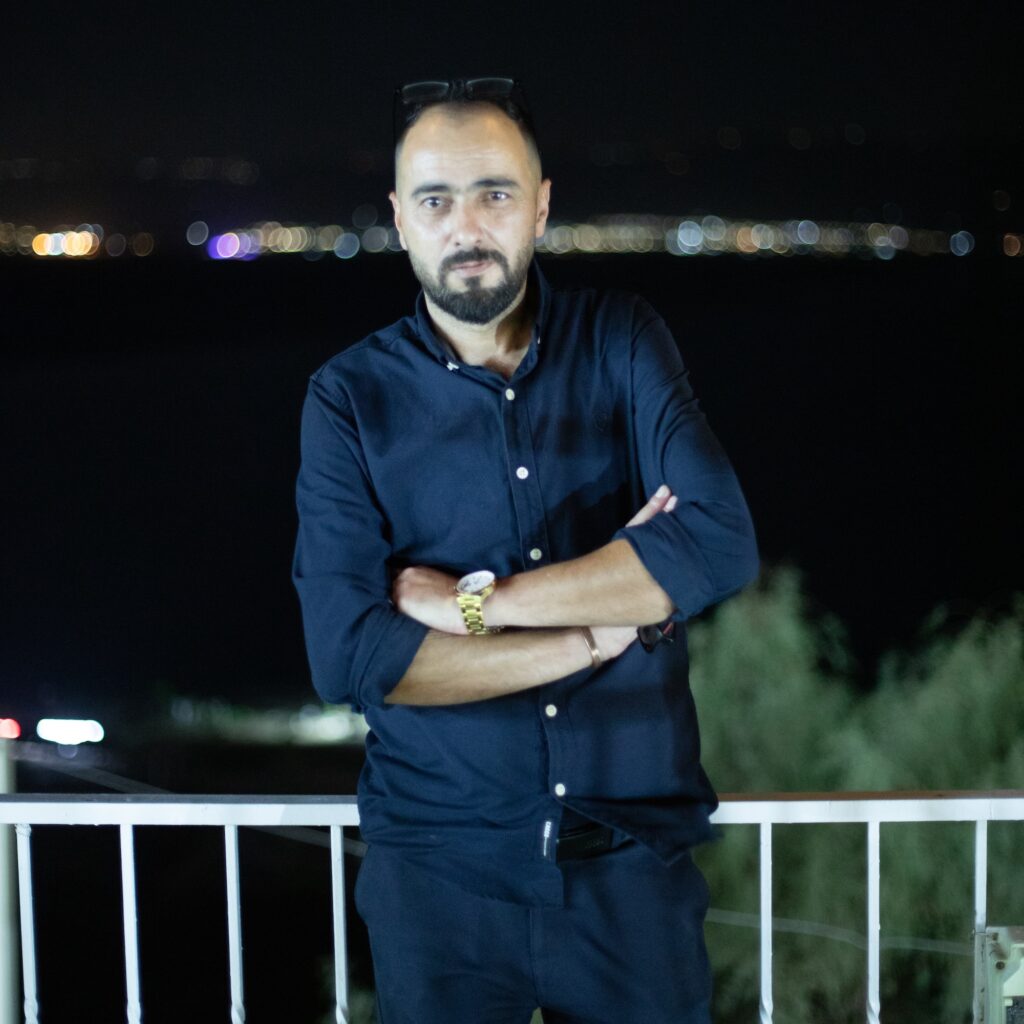
My name is Mohammad Al-Baw, I live in Halhul, a small village near Hebron. I joined the Parents Circle after my brother, Ferras, was killed in 2002 during the Second Intifada.
Two months ago, Israelis from a settlement nearby came to my family’s and my uncle’s family’s vineyards, about 16 acres of land passed down from my father, and pitched a tent. They planted an Israeli flag in the soil my father and grandfather cultivated. Israeli soldiers built a yellow gate blocking any Palestinian from entering. The soldiers guard the settlers. When I tried to walk onto my land, an officer told me, “You’re not allowed to enter.” His reason: “That’s the policy.” And just like that, a new policy was born.
On another day, when I filmed this scene, a soldier smashed my phone and said, “If you don’t leave now, I’ll kill you.” When I told him that if he is standing on my land, that is occupation, he replied, “There is no occupation.” He noticed the photos of my daughters in my wallet and asked if I worried about them. I told him: “Of course I am. You can take your children and go anywhere. I have only this place. We are like a fish. If you take it out of water, it will die.” His answer, “Okay, so die.”
These moments never make it into official records. They are not rare; they are happening across the West Bank. In the past, settlers might throw stones or burn a house. Today, they kill. There is no law here that protects us. The Israeli military protects them; Israeli police do not help us; Palestinian police cannot or do not protect us from settler violence.
Some people ask why I still work with Israelis. My answer is that if you believe in something, you don’t hesitate or give up. Even now, especially now, I meet with my Israeli colleagues. It is not easy.
My work with the Parents Circle has taken me into Israeli high schools and communities to tell my story in Hebrew, to speak about the Palestinian experience, and to insist that there is more to our lives than the black-and-white narratives of good and evil that we are taught.
I am Liat Atzili from Kibbutz Nir Oz.
My partner, Aviv and I built a life and a family in Nir Oz. We were an inseparable part of this little community, which fulfilled our aspirations and needs. Mine as an educator, and Aviv’s as a farmer and an artist.
On October 7th, our kibbutz was attacked, conquered, and destroyed by Hamas. A quarter of the residents were either killed or kidnapped, including me. The time I spent as a hostage in Gaza was of complete despair, unending fear for my friends and family, and long days. I was nervous that I wouldn’t survive.
After 54 days in captivity, I was returned home. The following day, my family and I were told that Aviv was killed on October 7th. Aviv had hundreds of friends, he traveled and created, and made the most of every opportunity; he truly loved life.In his final year, Aviv fulfilled many dreams, the greatest being to share his art publicly. While managing the kibbutz’s agricultural garage, he painted on tractor parts and scrap metal, blending his love for metals and the Negev fields into his creations. Our children looked up to him and I feel like I had the greatest privilege to share my life with him.
I always believed that war is not our destiny, and that any conflict, including ours, can be solved. This war has proven to me beyond a doubt that we cannot continue fighting, that we have no right to impose the continued suffering of war on future generations on either side. I am ready today, more than ever, to do everything in my power so that our children can live here in peace and security.
My name is Hala Al-Bukhari, and I live in Jerusalem.
My sister and her large family, including children and grandchildren live in Gaza. Despite the distance, I used to communicate with them daily, checking on their health via video call.
On the morning of October 7, 2023, my son told me to watch TV to see what was happening in southern Israel. From that day, fear has overwhelmed my heart.
Then came the morning of October 18, 2023, bringing the fateful news: My sister’s house was bombed, and she, her husband, her children, and grandchildren were in the house—33 innocent lives lost in this horrific massacre.
Two years later, and I’m not giving up.
With every word I write, I struggle to express the extent of my pain. Our hearts bleed with grief for those we have lost and continue to lose. Our sorrow is profound, and our souls yearn for the peace we all dream of.
Let us all live in peace and build a better future for our children. War brings only destruction and ruin to everyone involved, whether Palestinian or Israeli. It is always the innocent people who suffer the most.
